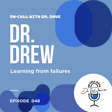Become a Creator today!Start creating today - Share your story with the world!
Start for free
00:00:00
00:00:01

050—Dr. Dave and Ashley Going Solo
In this episode, Dr. Dave and Ashley share their journey of launching Dr. Dave’s solo practice. They open up about transitioning from a group setting to full independence, balancing medical and business challenges, and how their complementary skills made it all possible. From navigating financing and legalities to creating a strategic marketing plan, they unpack the realities of building a practice from the ground up. Ashley also reflects on the rewarding nature of helping healthcare professionals reclaim their vision of medicine, while Dr. Dave discusses the authenticity and freedom he’s found in solo practice.
If you’ve ever wondered what it takes to run a medical business or dream of going solo, this episode is a must-listen!
Transcript
Introduction and Disclaimer
00:00:08
Speaker
Everything on the podcast is for entertainment purposes only. Nothing I say is meant to treat or diagnose, or it's not even an advice for you to follow.
Dr. Dave's New Venture
00:00:19
Speaker
So remember, when you're listening to the podcast, I am a doctor. I'm just not your doctor. Welcome to on call with Dr. Dave.
00:00:27
Speaker
I'm Dr. Dave, and it's been a while since we've had a podcast. We haven't completely moved away from podcasting, but our time has shifted into a new venture, and there's only so much time in life. So Ashley, do you want to talk a little bit about what we've been doing for the last, ah I guess it's been about eight months since we had a new podcast episode? Yeah, in the last eight months, we have been opening and growing a new practice.
00:00:56
Speaker
Dave went into private practice and it has been eating up some of our podcast time, but it was the right decision for us and well, we want to talk about it.
00:01:08
Speaker
Yeah, and even a little clarification, I've always been in private practice since finishing fellowship, but now I've started my own practice.
Transition to Solo Practice
00:01:16
Speaker
Going into a solo practice coming from a group practice brings a lot of new ventures, a lot of new knowledge that needs to come about.
00:01:26
Speaker
working for a another group, you're an employed physician. And I know there's a lot of employed physicians, whether you are in a hospital setting or private practice, but there's a difference between being an employed physician and being a partnered physician and or even different being a solo doctor. When you're a solo doctor, it's all on you. There's nobody else there. You're running the show, all aspects of medicine and also the business.
00:01:55
Speaker
And I've had a lot of help with actually having a business degree and being in marketing. And so that's been a huge help for my practice because we don't learn a lot about business in medical school. A lot of the people that are training us in medical school are people that have chosen to stay in a hospital setting. The vast majority of all residencies are in a hospital setting, and that means that the doctor's there, they're great doctors, but they work for a hospital system. They're not business owners, they're not necessarily entrepreneurs.
Starting a Solo Practice
00:02:28
Speaker
They work for a large corporation, and even though they can practice medicine in the way they want to, plus minus having somebody that sometimes dictates what to do,
00:02:39
Speaker
They don't have to worry about the day-to-day management of a practice. So specifically when going out on solo practice, there's a lot of moving parts. There's securing your financing. There's credentialing. There's legal is all um ah the up and up, especially if you've got a non-compete, finding the right locations and everything else. I was able to take the marketing piece of our new practice and run with it. And it has been a really great challenge. We talked a lot about just day-to-day stories on the podcast. We interviewed nurses and physician assistants and other doctors, nurse practitioners about just the day-to-day functioning of medicine in general. And now we're much more concerned of how to run a practice, practice management. Right now I have an office manager
00:03:34
Speaker
I have a medical assistant and as people grow their medical practice, they will sometimes hire nurses or nurse practitioners or physician assistants. And in some states, physician assistants and nurse practitioners may run their own solo practice. A lot of moving parts to keep track of when you're starting a business.
00:03:51
Speaker
And like Ashley said, the first step was deciding that's what I wanted to do with my career. It may be something that people have been thinking about that don't feel comfortable making that leap. It is a leap of faith. First thing out of fellowship, that's kind of what I wanted to do is I was finishing up fellowship and I called a colleague of mine that trained where I trained and I asked him, hey man, you just, you did this. You went solo and he had not done it initially, but he did it after a few years. I talked.
00:04:21
Speaker
through all the ins and outs of running your own business and it being a practice owner at the end of the day i came out of medical school residency fellowship with a significant amount of medical school debt student loan debt and a couple young kids and so at the end of the day we decided it wasn't the right time for me to invest the time and the money that was needed to start a practice. And we took the safe route. And so I was an employee physician for about six years, which is nice. I had a steady paycheck for six years. I was able to get more comfortable as a surgeon and as a doctor. I was able to get my kids and my family in a really nice, stable place as they're older now. They're a little bit more self-sufficient. Not that I want to spend all my time at the practice. I still want a nice balance with my wife and my kids.
00:05:10
Speaker
But it was different six years later. And so the first step was deciding, yes, I wanted to do that. Not everybody has that inclination. Not everybody wants to ah own their own business or run their own practice.
Choosing the Right Location
00:05:20
Speaker
Yeah. And to be clear, I did not help with any of the marketing or business ah work while Dave was in this practice group. I had been working for various clients in all kinds of industries for a long, long time, put us through medical school, through residency, through fellowship, and continued on. So I've worked in the industry for a very long time. However, we had never worked together in that kind of capacity. Yeah, I guess the closest we got was doing the podcast because we would sit here and talk and interview people. And I'd get the doctors and the nurses on because I'd reach out to different contacts. And you did more some of the marketing and some of the editing for the podcast, but nothing nothing of this scale.
00:06:02
Speaker
So once I decided to go private so or solo, then there were the first choices to be made is where and looking at where you can and can't work, especially if I non-compete. Are you moving or you're not moving? Commute. But whether or not you have that at all, you need to look at a place that you're going to be happy working. So it needs to be someplace you want to be.
00:06:24
Speaker
happy working, living, that your family's going to be happy staying. But just like any business, you need to make sure there's a market for what you do. I do oculofacial plastic surgery. So i I do it for medical reasons and cosmetic reasons. But let's say you're strictly cosmetic. You're probably not going to move to a small town in the middle of nowhere with a small population. It's just not going to work out, especially with cosmetics. Even with that, I do it specialized enough. I need a larger area. But let's say you're a family primary practice person.
00:06:54
Speaker
Maybe that's the
Legal and Financial Protection
00:06:55
Speaker
ideal place. You're the only doctor around. People have to travel 50 miles to see anybody else. And you get a monopoly on the patients in that area. So one, finding a place that you want to work. But then two, you need to do the research. Is it a growing market? Is it not a growing market? um What's your competition like? Is this a good place, a bad place for all the business reasons as well? So I put together a marketing plan. Part part of going solo is securing that financing from the bank.
00:07:22
Speaker
The bank wants something called the pro forma, which is all of your financials, things like that. Part of that is getting them a marketing plan. The marketing plan will have all of that information in it to tell the bank whether or not it's a good investment. Now, you should have done enough research prior to this to know whether the population can sustain the kind of doctor you are and that it's legal with what whatever non-competes that you have. However, the nitty gritty details things that the bank really wants to hear when OKing your pro forma, I put together in a marketing plan about where you're going to be, what the population was like. Is it growing? Is it declining? What the market is? What the marketing plan is? All of that was put together in a package and delivered to the bank along with the projected financials.
00:08:09
Speaker
Yeah. So big step is deciding you want to do it and then you how are you going to pay for it? Yeah. At the end of the day, no matter what your dreams are, you need to be able to pay for the startup. But every startup is going to be a little different than what the equipment you need and the size of the office and how much rent is going to be or if you're buying a building. A lot of different factors go into that and it's going to be specific to what you're doing. But at the end of the day, you need money, capital.
00:08:34
Speaker
and If you don't have that if you're not independently wealthy or if you haven't been in practice for a decade or more where maybe you're just gonna finance it yourself Getting money from a bank or you know, you can go to family members and you can do it that way but you know borrowing money from family can get a little hairy can ruin relationships and not every business idea works or successful most doctors practices do okay, but not every doctor has a good marketing team, some doctors fail, and taking your family's money and going down with the ship's not a great idea. One of the ways we protected ourselves was what was to do a professional LLC, so limited liability company.
00:09:18
Speaker
You see it on a lot of different things. It's just a protection for your own personal finances versus a business. And if my business fails, then the business has to pay for that. But my personal finances don't have to cover any of the expenses or any of the failures. Now, it's something that's been, ah you know, this is not business 101. So we're not going to tell you all the ins and outs of an LLC.
00:09:42
Speaker
But at the end of the day, you need to be protected. And doing that is formalizing that you are a business and not a personal entity. You don't want to do this all under your own name. And then once you bring the government into it, especially with medical stuff, there are HIPAA rules, there are compliance issues, there are a lot of things you have to know to do right.
00:10:01
Speaker
you're gonna probably make mistakes unless you involve experts. So we're gonna have people that are familiar with the medical world and what's allowed and not allowed. So actually did all my marketing and advertising and the business plan, but we also had some consultants that have helped set up practices before utilizing the expertise of other people. We also hired a lawyer to make sure that everything we did was legal. We didn't want to make any of those big mistakes.
00:10:27
Speaker
That's important when you're starting because like I said, you don't go to business school when you're a doctor. You need to leverage the expertise of people that know what they're doing. I'm great at doing oculofacial plastic surgery. You need a blepharoplasty. I do that all day long. I can do a blepharoplasty, no problem.
00:10:42
Speaker
If you need to look at, you know, like a pro forma, or if you need to look at, you know, like an ah ROI and different things, those are all things that I'm learning and I'm getting a lot better at some of the business terms. That being said, leverage expertise, but also don't sell yourself short. you You've learned things, you can always learn things on your own. I've also been a part of groups. There are some groups of solo doctors that have different subspecialties that will help and support you along the way.
00:11:10
Speaker
From what I know about doctors is doctors love to doctor. And again, they're too busy being doctors to really look into a lot of that stuff, which is why leveraging expertise is so important. And like you said, most doctors do fine, but the difference between someone who does fine or makes a living or someone who really, uh, really kills it for lack of a better term, a lot of that comes down to the marketing and paying attention to that. And.
00:11:39
Speaker
what we call in the business lead generation, getting more patients. finding them where they are, how to do that when maybe, legally, you are constrained with a non-compete, or you're in a brand new town with no name recognition at all. How do you get that social proof? How do you get those testimonials? What are the systems in place to streamline those processes so that you can become as a successful as you want to be? Because nobody goes into solo practice hoping to close their doors.
00:12:12
Speaker
There's a lot of psychology research on this, but expertise is not transferable or translatable. that being That means that just because you're an expert in one field does not mean you're an expert in another field. And a lot of smart people have made a lot of stupid mistakes because they assume, because they are really good and smart in one area, that they're going to be good and smart in another area.
00:12:35
Speaker
If you look at just there's a whole list of Nobel laureates. So people have won the Nobel Prize. Some of the smartest people on the planet and some of the crazy things they have believed or errors they have made in other fields. And so I want to drive that home that as a doctor you have a lot of training in medicine.
00:12:52
Speaker
in what you do and you have training in your specialty or your subspecialty, we do not have training in business.
Marketing and Online Presence
00:13:00
Speaker
You will learn that. I'm learning a lot as a business owner and as a practice owner. So it is something, it is a skillset I'm learning and getting better at.
00:13:08
Speaker
but it is not just going to happen. You're not going to be good at it just because. you And especially as you're starting, you need to have those people around you that can support you. Ashley is an expert in business. She's an expert in marketing. That's what she spent over her whole career doing for 20 years when I've been focused on how to suit your appropriately, what the best suit your techniques are, what antibiotic resistance is in my area, and what can I, you know, so all those things that I am an expert in, she's been doing the same thing with marketing.
00:13:36
Speaker
One of the nice things too is she's done marketing for a lot of different businesses but then she's learned the more just in the last six months. She's still continuing to work with my practice and she understands it more than you did did six months ago. I was able to apply the skills I had to this particular industry in a way that I've never been able to do in other industries because I know so intimately the psyche of who I'm working with and I've been able to coach Dave through how to present himself on social media in a way that he's never had to do before. Because typically when he's presenting, he's presenting to other medical professionals. There's a different way to do that to the general public than it is to end ground rounds. Knowing the person that I'm working with, knowing why they got into medicine, what their dreams are, what they want their practice to be, and what I have found, because I'm not just working with him now. I have other practices and plan to help other practices do this.
00:14:31
Speaker
and open their doors is that we all know that nobody gets into this for the money they want to help people. And to be a part of helping them practice medicine the way that they ah have always wanted to practice medicine as a solo practitioner has been incredibly fulfilling, rewarding. It's been challenging, but also we've been successful.
00:14:56
Speaker
Not to toot our own horns, but I guess to toot our own horns. We've done well, especially for the first four months. We opened up the kind of mid-July kind of a soft opening and then September our grand opening. So we haven't been open that long.
00:15:12
Speaker
And as far as people coming to the doors, the number of patients I've been able to see and take care of in the last few months has been pretty significant. It's beyond our projections. Banks want projections of how well you're going to do. I think looking at those, we did much better than our projections. I think a lot of that comes down to taking care of people.
00:15:31
Speaker
you know that's That's the goal. When you are starting your own practice, whether you're fresh out of medical school and residency or you've been in the industry for a while, when you're starting your own practice and you decide that's what you want to do is because you have a vision of how you want to take care of people, how you want to practice medicine. And I think people feel that and know that.
00:15:51
Speaker
And our industry is still, as much as we do social media and we do you know some advertising in magazines and we try to optimize what we do, a lot of what we do is still word of mouth. It's still just taking really good care of people and then people hear about that and know about that. so patients will talk to their loved ones. You talk to them after surgery or before they come in with loved ones, they talk to each other. And if they have a good experience, they're going to recommend you when they need to have the same type of surgery. Or doctors, if you take great care of their patients and they referred you a patient and the patient comes back and says, you know, Dr. Dave did such a great job with me. And of course, I'd obviously don want to send another patient there because not every experience with a doctor
00:16:37
Speaker
goes the way you want. I know I've sent people to other doctors and they come back and say that doctor wasn't kind or they didn't treat me very well and I'm not very motivated to send another patient that direction again.
00:16:48
Speaker
Well, this speaks to how we buy things now. We buy things on reviews. That's how we buy them. It is the new word of mouth. we ah We rely on word of mouth, but also when we're flying blind or we don't know anybody to ask, we rely on the reviews of strangers. Social proof is a huge, huge piece.
00:17:07
Speaker
of a marketing strategy for any service provider and especially for medicine and the more that you can show that you do care about your patients and that those positive reviews start coming and you start getting not only word on the street word of mouth but also Digital word of mouth and that's tricky as a doctor like I don't want to bother my patients by asking for a review I I don't want that I want to take care of people and I want them to be happy and have a successful outcome from the surgeries I do
00:17:41
Speaker
It feels a little icky to talk to a patient or ask them for review. There's some ways that we are working on it. We can talk about some ways for utilizing some less aggressive techniques. There are hands off ways to ask. Different ways to ask and some people volunteer because they know it's important. But at the end of the day, that is our modern world. I don't like that there are websites, rating doctors, just because it feels, not that you we should know, not that people don't deserve to know if their doctor's good or not, but because of the way it's kind of done and we go about it, it just doesn't fit with our, you know, the, the Hippocratic oath and this person we're supposed to be, it doesn't feel natural or right. But at the end of the day,
00:18:31
Speaker
We have to have an online presence. yeah Otherwise people aren't going to take you seriously in today's day and age. You have to have an online presence and you need to have good reviews. Well, and also this demonstrates the the difference in why you need a marketing professional with you is because if it was up to him, he wouldn't be asking for reviews and it wouldn't be a top priority. And maybe the online presence wouldn't be as a forefront.
00:18:58
Speaker
as or at a priority. I've never liked it. You've never liked it. I know you've never liked it. Like my last practice did a very good job with social media they did presence. They did a great job and and I put my full effort into it. Filming things for medicine or the practice has never been my ideal. And also I, is you know, like asking somebody to give you a review.
00:19:22
Speaker
it just feels like you're asking for compliments. It's like you're fishing for compliments, like going out on a date where you're just like, hey, don't you like this? Or you just, it doesn't come naturally to me at all. I don't think it comes naturally to most people that ask for the positive i feedback or anything like that. It's just a reality of business and i don't I don't think you have to be comfortable with it as a doctor. I don't think you have to enjoy it really, but you have to find, make some peace with doing it.
Strategic Marketing for Growth
00:19:50
Speaker
well This is one of the things that I try my best to the the doctors that I have worked with thus far to wrap their minds around the fact that it is generous to ask your patients to review you so that others know you're a good doctor. It's a generous act to share your information on your social media feed. It's generous to let people know where you are and how to find you and how you can help them to facilitate ways for them to find you is
00:20:20
Speaker
generous because you want to take care of them. You don't want to take advantage of them. That's not what we're doing here. We're trying to take care of them. Well, yeah. And you bring up a good point too, not that I need the self-congratulation component of it. So I'll try to kind of wrap my head around like I'm doing a public service just by letting people know what I do and what I do well. So moving forward to making sure that we're still on an upward trajectory. It's not as simple as like we're going to post on Instagram.
00:20:48
Speaker
There's a whole strategy here, especially because the medical patients that come to you are referred by other physicians. And then there's a cosmetic side that is a direct consumer. So you've you've got to have a strategy that targets both. If you're kind of like, oh, we'll just throw up a website and we'll just throw up an Instagram or a Facebook feed, throw open our doors and just see what happens. That is not going to be enough to drive the growth and the success. Again, you want to work with a professional. You want to make sure you're branded right. You want to make sure that you're you've got systems in place. You have to make sure that your website is actually SEO friendly, that you're able to be found. All of those things are paramount to the kind of success that you want because it's not like you're borrowing a little bit of money to do this.
00:21:38
Speaker
You're typically borrowing a big chunk of change to do this. You want to make sure that you are set up for success as early as possible, and that includes working with someone like me. Well, just like I am a specialist in what I do, and I do a very specific job, should you come to me if you have chest pain? No. No. Should you come to me if you have some GI upset? Oh, man. Any time our kids had like sore ears, he's like, what are you bugging me for? Like, go go to the right person. Oh, go to the right doctor. So just like with a doctor, you're not going to go to just any doctor just because they're a doctor. If you're looking at doing marketing, there's no reason to go to just a marketing firm or somebody that is in marketing. It's beneficial to go. Somebody has expertise and knowledge in
Collaboration between Medicine and Marketing
00:22:22
Speaker
what you're after. So go to the best person for you. and So if you're looking for a doctor, go to the best doctor for your problem.
00:22:29
Speaker
If you're looking for somebody that does marketing and you have a medical practice, go to somebody that has expertise in medical marketing. right And it's a whole different language. i mean It is a completely different language. Being married for 20 years, not that she has a medical degree, but she she knows what it's like to go through medical school and to match. She knows what it means to match. Some people that aren't medical might be listening to this and are like, what's a match? She knows what it's like to do a residency match, a fellowship match, to move. She knows some of the terms.
00:22:59
Speaker
just the day in, day out, the finances of being a doctor, what the student loan debt looks like. There's just a lot of things that are unique to being a doctor. Now I am working with a pain management doctor who has decided to go solo from a large hospital system. He decided it's time to do that. I've branded an orthopedic practice as well. It's been really great and I want to help as many people as possible because I also know that you know what it's like to be under a financial stress like no one else knows what it's like to be under a financial stress. I personally do not believe in charging for more than what you need dependent upon doctor's referral but patterns and also their
00:23:47
Speaker
their name recognition, how long they've been practicing, if they're going to new area. This is all sliding scale. And if you're working with a marketing firm who is just gonna throw everything at you to see what you can say yes to because marketing firms will take advantage when they see doctor in front of somebody's name.
00:24:07
Speaker
If they're well known in the area and they need, they have great recognition. They have a great referral base. Maybe they do only need a basic like logo, some cards and a website just for people to find it. They just need branding. Yep. Versus somebody that is going new. They're out of fellowship. They're starting new in a community. Nobody knows who the heck they are. They have no long-term patient data. That's a very different startup. Has going into solo practice been worth it?
00:24:35
Speaker
It definitely has been. There's nothing wrong with different ways of practicing medicine. My mentors and people that I look up to are still in academic medicine. It's a great way to work and it's a great way to be. Large group practices definitely have their benefits. There are so many different nuanced ways to run a business and to have a practice. But at the end of the day, I'm much happier running my own practice. The the practice feels more authentically me because as the doctor and as the owner of the practice, it's just ah it's a complete extension of who I am.
00:25:15
Speaker
And on that note, I know that, uh, that Dave feels awkward about self promotion, but I do not. So if you think that going into solo practice might be something worth exploring, I'll leave my calendar link. We'll talk it through and see what you're dealing with. What are the constraints you're feeling? Cause I'm looking to work with more doctors like this. It's been incredibly fulfilling to watch someone and multiple people now.
00:25:42
Speaker
help them be successful in what they're doing, which is the best part
Invitation for Collaboration
00:25:46
Speaker
of my job. And it's always been the best part of my job is helping people be successful in their businesses. So if you would like to reach out, let me know. And also we want to know, do you guys want to hear more about the ins and outs of starting a solo practice?
00:26:03
Speaker
Yeah, if you have specific questions and part of a group that support we support each other, there are doctors that are in solo practice and they ask a bunch of questions and it's active. So I know there's a lot there are a lot of questions out there. There are a lot of things that people don't know.
00:26:18
Speaker
And all of us are now running our practices, so that's how we're part of the group. But if you're just thinking about it, or you're just kind of storyboarding, or you're just in the contemplative stage right now, maybe you're not part of any group, but you have questions about what does it look like to leave? What does it look like to resign from a practice? How do you take those first steps? Those are great questions to ask, and you may not have a sounding board or somebody to reach out to.
00:26:44
Speaker
And so this can be the sounding board and I'm busy running my own practice. I might have some brief answers for you and then I might direct you towards Ashley who this is what she does. But if there's specific questions for me, I'm happy to take them. And then for the most part, Ashley would know a lot of those same questions because she went through it with me or the more business minded questions would go to you anyway. Sure. I'm happy to fill out those. so So we'll hopefully talk to you soon. Hope to hear from you as well. Sure.
00:27:14
Speaker
sure Hi, this is Dr. Dave. Thank you so much for listening to this week's episode. Please rate, review, and share this episode so that we can continue to get you more stories in the future.



















